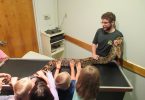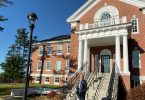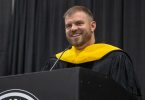How Unity College is introducing its mission and curriculum to more people in new locations while continuing to invest in students at its Flagship
In late August, the incoming class of 223 students and their families descended on Unity College’s Flagship in Unity, Maine, to settle into their residence halls, meet their classmates, and prepare for the next chapter of their lives. It’s a typical scene for the beginning of the Flagship semester, but the incoming class now stretches beyond those moving in at 90 Quaker Hill Road, with more than 60 additional first-year students pursuing their bachelor’s degree through Distance Education. Add to that the returning undergraduates for both Flagship and Distance Education, as well DE’s master’s students, and nearly 1,000 students will be learning and working toward earning a degree from America’s Environmental College.
The record-setting numbers stem from the College’s Enterprise Education model, which was adopted several years ago, and will continue to be built upon in the coming years. This model, which is made up of three key arms known as Sustainable Education Business Units — Flagship, Distance Education, and Sustainable Ventures — gives the College flexibility to better meet student needs while also reaching new learners who could benefit from courses or services that are either currently offered at Unity College or will be.
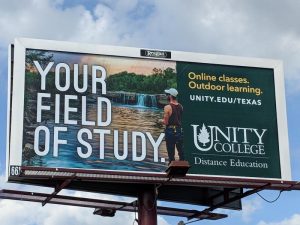
Under the new Enterprise structure, Unity College announced this summer that Dr. Amy Arnett, who previously served as the Chief Distance Education Officer, would take on the role of Vice President of Distance Education at Unity College, and Zach Falcon, Associate Professor of Conservation Law and Environmental Policy, would become the Vice President of Flagship.
“This restructuring of leadership and the Enterprise approach as a whole is truly an investment in our students’ education,” said Unity College President Dr. Melik Peter Khoury. “Zach and Amy will be dedicated to focus on their respective SEBUs, ensuring their success. With these two SEBUs in particular — Flagship and Distance Education — our primary outcome is the success of our students. We want to ensure that all of our students are set up for success so that after earning their Unity College degree they have the tools to put to good use and become leaders in sustainability.”
Under this new structure, Arnett and Falcon will report and collaborate with President Khoury, and also partner with the College’s chief officers who are dedicated to continuing the Enterprise build-out. They will also be responsible for the day-to-day operations of the SEBU while overseeing growth and change, which both SEBUs have seen a lot of recently.
 “Our Distance Education program is intentionally designed for adults who may have families or work full-time and are not be able to attend classes in person,” said Arnett. “Distance Education was created to offer flexibility, so that learners can reach their goals at a pace that fits their lifestyle, and so far, we have exceeded our already lofty enrollment expectations, and we’re on track to continue that trend.”
“Our Distance Education program is intentionally designed for adults who may have families or work full-time and are not be able to attend classes in person,” said Arnett. “Distance Education was created to offer flexibility, so that learners can reach their goals at a pace that fits their lifestyle, and so far, we have exceeded our already lofty enrollment expectations, and we’re on track to continue that trend.”
DE is also looking to increase its micro-credentialing program, to give adult learners who are working part-time or full-time an opportunity to take the next step in their careers. As DE continues its exponential growth, the staff outgrew their office space just down the road from the Flagship in Unity, Maine, and joined the Pineland Farms community in New Gloucester, Maine in October.
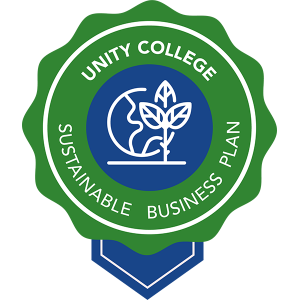 “It’s a natural fit with our mission,” said President Khoury. “Our Distance Education staff, who help facilitate a sustainable-minded education to students all over the country, are themselves surrounded by sustainable farms and local foods in a beautiful setting, which is overseen by a like-minded organization.”
“It’s a natural fit with our mission,” said President Khoury. “Our Distance Education staff, who help facilitate a sustainable-minded education to students all over the country, are themselves surrounded by sustainable farms and local foods in a beautiful setting, which is overseen by a like-minded organization.”
Meanwhile, Unity College’s Flagship has re-envisioned the residential experience for students in their first two years of college with TERRAIN.
TERRAIN at Unity College uses Expeditionary Learning as its educational model, creating innovative courses where students receive comprehensive, relevant, and outcome-based opportunities to build or retool their knowledge and professional skills in sustainability fields. TERRAIN brings an integrative approach to learning, allowing students to learn where they live in Expeditionary Learning Communities.
In addition to TERRAIN, in the past five years Unity College’s Flagship has seen renovations and new building projects, including:
- Three new residence halls built to LEED Silver standards
- A Student Services Center putting all resources students need conveniently under one roof
- A new, state-of-the-art science lab located in Founders Hall South
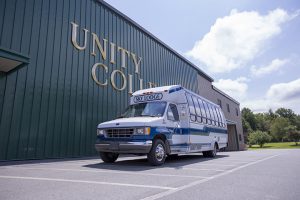 U-Go shuttle and bike services, which provide reliable, safe, and sustainable transportation for students between College-owned facilities and nearby towns
U-Go shuttle and bike services, which provide reliable, safe, and sustainable transportation for students between College-owned facilities and nearby towns- A historic sporting lodge in Maine’s Moose River Valley that sits on more than 150 acres
- A new, modernized facility for the Collaborative Learning Center
- A three-fold increase in the number of electric car chargers
- Renovating The Unity College Center for the Arts with a new media lab for graphic art, photography, and documentary film; and new space for sculpting and ceramics
- Upgraded lab facilities in the Koons Hall lab
“I am excited at the opportunity to help further the Unity College mission at this critical moment in our growth as an institution,” said Falcon on his new role. “Unity students are unique – their passion for the environment and commitment to changing the world through meaningful work is inspiring. I look forward to working with President Khoury to support our students and secure the future of the Flagship. The faculty and staff of the Flagship are tireless in their dedication to the work of Unity, and I am proud to be joining in the effort in this new role.”
“Our new strategic plan is centered on audiences — both old and new — who could benefit from a Unity College education or service that we provide, and meeting their needs,” said Dr. Khoury. “Whether it’s a four-year residential student coming straight out of high school, or a veteran who lives halfway across the country and cannot uproot their life to move to Unity, Maine, or a local business looking to educate its employees on how to become more sustainable, our goal is to offer them what they need to take that next step.”

